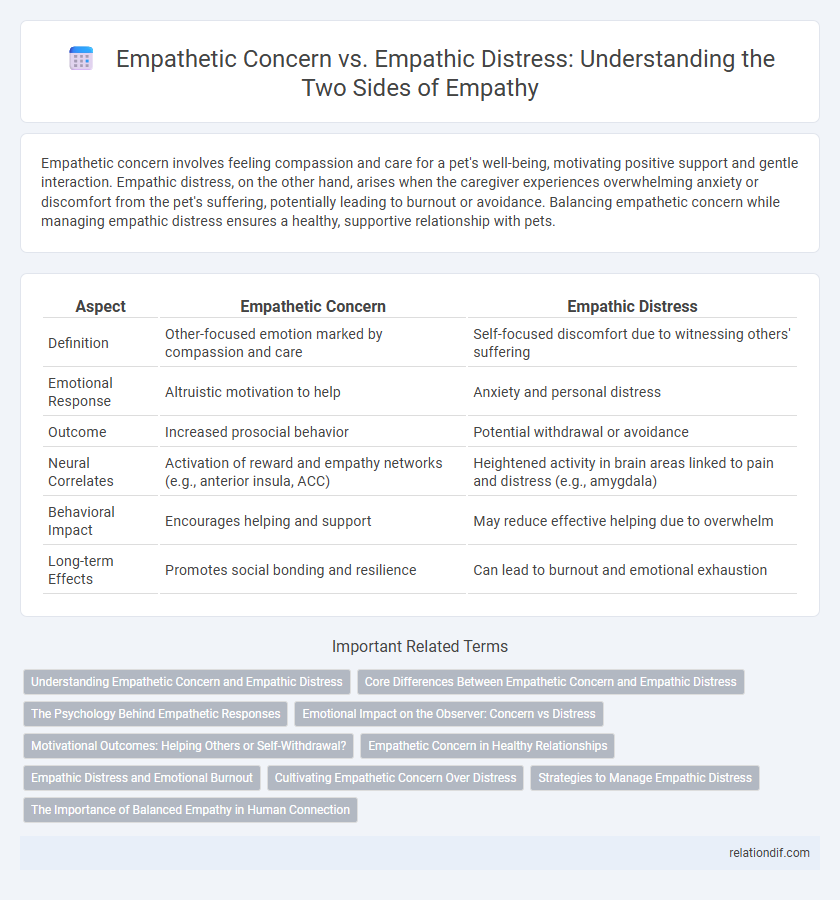Empathetic concern involves feeling compassion and care for a pet's well-being, motivating positive support and gentle interaction. Empathic distress, on the other hand, arises when the caregiver experiences overwhelming anxiety or discomfort from the pet's suffering, potentially leading to burnout or avoidance. Balancing empathetic concern while managing empathic distress ensures a healthy, supportive relationship with pets.
Table of Comparison
| Aspect | Empathetic Concern | Empathic Distress |
|---|---|---|
| Definition | Other-focused emotion marked by compassion and care | Self-focused discomfort due to witnessing others' suffering |
| Emotional Response | Altruistic motivation to help | Anxiety and personal distress |
| Outcome | Increased prosocial behavior | Potential withdrawal or avoidance |
| Neural Correlates | Activation of reward and empathy networks (e.g., anterior insula, ACC) | Heightened activity in brain areas linked to pain and distress (e.g., amygdala) |
| Behavioral Impact | Encourages helping and support | May reduce effective helping due to overwhelm |
| Long-term Effects | Promotes social bonding and resilience | Can lead to burnout and emotional exhaustion |
Understanding Empathetic Concern and Empathic Distress
Empathetic concern involves other-focused feelings of compassion and care, motivating prosocial behavior and support for those in distress. Empathic distress, by contrast, is self-focused discomfort stemming from witnessing others' suffering, which can lead to withdrawal or avoidance to reduce personal emotional overload. Understanding the distinction between empathetic concern and empathic distress is crucial for fostering effective emotional support and enhancing interpersonal relationships.
Core Differences Between Empathetic Concern and Empathic Distress
Empathetic concern involves an other-focused emotional response characterized by feelings of compassion and a desire to help, whereas empathic distress is a self-focused reaction causing personal discomfort and anxiety. Core differences include the motivational outcomes: empathetic concern leads to prosocial behavior and support, while empathic distress often results in withdrawal to alleviate one's own discomfort. Understanding these distinctions is crucial for developing effective empathy-based interventions in clinical psychology and social work.
The Psychology Behind Empathetic Responses
Empathetic concern involves an other-focused emotional response characterized by compassion and a motivation to help, rooted in understanding another's feelings without personal distress. In contrast, empathic distress triggers self-focused discomfort and anxiety, often leading to avoidance behavior to reduce one's own emotional turmoil. The psychology behind these responses highlights distinct neural and cognitive mechanisms, with empathetic concern activating prosocial circuits and empathic distress engaging self-regulation processes tied to emotional overload.
Emotional Impact on the Observer: Concern vs Distress
Empathetic concern triggers compassionate feelings and motivates helping behavior by fostering emotional resonance with another's suffering, promoting prosocial actions and psychological well-being. Empathic distress, however, induces self-focused discomfort and anxiety, often leading to withdrawal or avoidance to reduce personal emotional pain. The emotional impact on the observer diverges as concern cultivates altruistic engagement, while distress risks emotional fatigue and decreased helping tendencies.
Motivational Outcomes: Helping Others or Self-Withdrawal?
Empathetic concern triggers altruistic motivation, leading individuals to actively help others in distress by prioritizing their needs over personal discomfort. In contrast, empathic distress generates self-focused distress and anxiety, often resulting in avoidance or withdrawal to alleviate one's own emotional discomfort rather than addressing the other's suffering. Understanding these distinct motivational outcomes aids in developing interventions to foster helping behaviors and reduce self-centered responses in social and clinical contexts.
Empathetic Concern in Healthy Relationships
Empathetic concern involves feeling compassion and care for others, fostering supportive and healthy relationships by promoting prosocial behaviors and emotional connection. This form of empathy encourages understanding and helping without becoming overwhelmed, contrasting with empathic distress that can lead to burnout or withdrawal. Cultivating empathetic concern enhances trust, emotional intimacy, and mutual support, which are essential components of strong, resilient relationships.
Empathic Distress and Emotional Burnout
Empathic distress occurs when individuals become overwhelmed by the suffering of others, leading to emotional exhaustion and reduced ability to provide support. Unlike empathetic concern, which motivates prosocial behavior, empathic distress can trigger avoidance and self-protection mechanisms. Prolonged empathic distress significantly contributes to emotional burnout, particularly in caregiving professions, by depleting emotional resources and increasing stress levels.
Cultivating Empathetic Concern Over Distress
Cultivating empathetic concern involves fostering an other-focused emotional response that motivates helping behaviors and prosocial actions, rather than experiencing empathic distress, which triggers self-focused discomfort and avoidance. Research shows that empathetic concern activates brain regions linked to caregiving and compassion, promoting effective support without emotional burnout. Developing strategies such as mindfulness and perspective-taking enhances empathetic concern, enabling sustained empathy without the detrimental effects of overwhelming personal distress.
Strategies to Manage Empathic Distress
Empathic distress occurs when exposure to another's suffering causes self-focused discomfort, potentially leading to burnout. Effective strategies to manage empathic distress include practicing mindfulness to maintain emotional boundaries, engaging in self-care routines to replenish mental resources, and employing cognitive reframing to shift perspective from personal anguish to compassionate action. Training in emotional regulation techniques enhances resilience, allowing individuals to sustain empathy without compromising their own well-being.
The Importance of Balanced Empathy in Human Connection
Balanced empathy cultivates healthy relationships by fostering empathetic concern, which motivates prosocial behavior and emotional support without overwhelming the individual. Empathic distress, characterized by personal anxiety and discomfort from another's suffering, often leads to withdrawal and decreased helping behaviors. Maintaining a balance between these forms of empathy enhances resilience, emotional clarity, and effective social bonding.
empathetic concern vs empathic distress Infographic

 relationdif.com
relationdif.com